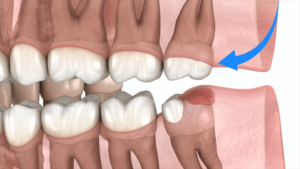
Wisdom teeth often get a bad reputation, but have you ever considered the benefits of keeping them? While these teeth may seem unnecessary, they actually offer several surprising advantages when they are properly aligned and healthy. In this guide, we will explore the many benefits of keeping your wisdom teeth and why they might be worth retaining.
What Are Wisdom Teeth?
Wisdom teeth are the third set of molars that emerge in your late teens or early twenties. These latecomers often face challenges in eruption and alignment, leading many people to opt for their extraction. However, they can play an important role in your overall oral health if left intact.
Benefits of Keeping Wisdom Teeth
While wisdom teeth are often removed due to alignment issues or overcrowding, there are several key benefits of keeping wisdom teeth. Let’s dive into these advantages.
1. Functionality: Keeping Your Wisdom Teeth for Chewing Efficiency
One significant benefit of keeping wisdom teeth is their functionality. If your wisdom teeth emerge properly and are healthy, they can help with the chewing process. They aid in breaking down tough foods, improving the efficiency of your bite and providing an extra set of molars for chewing.
2. Maintaining the Natural Structure of Your Mouth
Another benefit of keeping wisdom teeth is the preservation of your jaw and dental structure. These teeth help to maintain the alignment of the surrounding teeth. By keeping them intact, you help prevent your other teeth from shifting, which can lead to misalignment over time. This is especially important in maintaining a healthy bite and preventing future dental problems.
3. Longevity and Durability of Wisdom Teeth
Wisdom teeth are some of the most durable teeth in your mouth. Keeping your wisdom teeth provides additional support and strength to your dental structure, which can be useful if other teeth wear down or become damaged. They are built to last, providing long-term benefits to your overall oral health.
Understanding Wisdom Teeth Extraction
Despite the benefits of keeping wisdom teeth, many people opt for extraction. Let’s explore the reasons why wisdom teeth are often removed and the potential risks involved in this process.
Reasons for Wisdom Teeth Extraction
Wisdom teeth are often extracted due to misalignment, insufficient space in the mouth, or the risk of decay. When they grow in improperly or become impacted, they can cause pain and discomfort, leading to the decision to remove them.
Risks of Wisdom Teeth Extraction
While the extraction of wisdom teeth is common, it does come with certain risks:
- Nerve Damage: Deeply rooted wisdom teeth may cause nerve damage, leading to numbness in areas such as the lower lip or chin.
- Dry Socket: A painful condition caused by the dislodging of the blood clot after extraction, exposing the bone and delaying healing.
- Damage to Nearby Teeth: If wisdom teeth are crowded or difficult to remove, they could potentially damage adjacent teeth.
To Extract or Not to Extract: Making the Decision
The decision to keep or extract your wisdom teeth should be made in consultation with a dentist. They will evaluate the health, position, and alignment of your wisdom teeth to help you make an informed choice.
When Should You Keep Your Wisdom Teeth?
If your wisdom teeth are healthy, fully erupted, and properly aligned, keeping them could benefit your oral health in the long term. They provide natural support and contribute to your overall dental structure.
When Extraction Might Be the Best Option
If your wisdom teeth are misaligned, causing pain, or creating overcrowding in your mouth, extraction might be the best option. A dentist will be able to assess whether extraction is necessary to maintain your oral health.
Frequently Asked Questions (FAQs)
Does everyone have wisdom teeth?
Not everyone has wisdom teeth. Some people have one, two, three, or none at all.
Can wisdom teeth cause headaches?
Yes, impacted wisdom teeth can create pressure on nearby teeth, leading to headaches.
How long does it take to recover from wisdom teeth extraction?
Recovery typically takes a few days to a week, but full healing can take longer.
Is wisdom teeth extraction painful?
No, anesthesia is used during the procedure, so you shouldn’t feel pain. Post-surgery discomfort can be managed with pain relief.
Can wisdom teeth grow back after extraction?
No, once wisdom teeth are removed, they do not grow back.
Conclusion
While wisdom teeth are often associated with pain and removal, they can provide significant benefits when kept healthy and properly aligned. They help with chewing, support the natural structure of your mouth, and offer long-term durability. However, if your wisdom teeth are causing problems, extraction may still be the best option.
Consult with your dentist to evaluate whether keeping your wisdom teeth is the right choice for you. Together, you can decide what’s best for your oral health.
Schedule a consultation with us today to assess the health of your wisdom teeth and determine the best course of action for your dental care.
